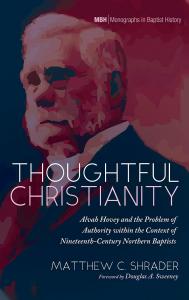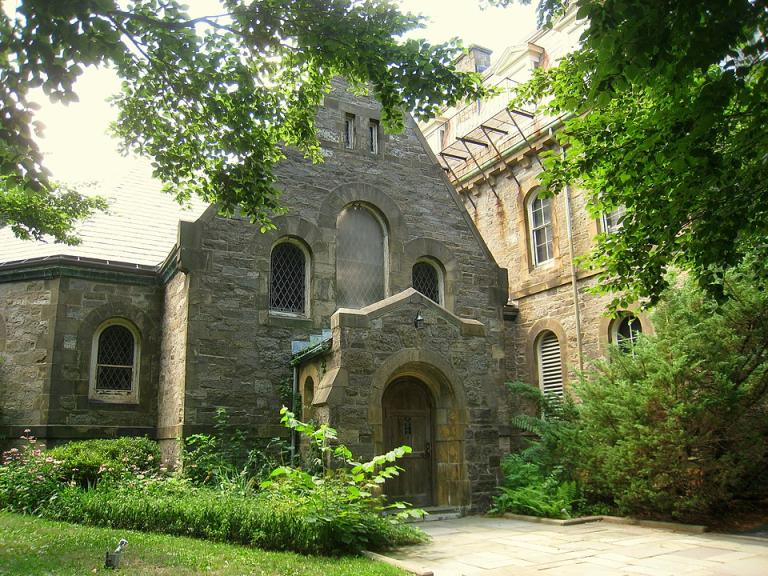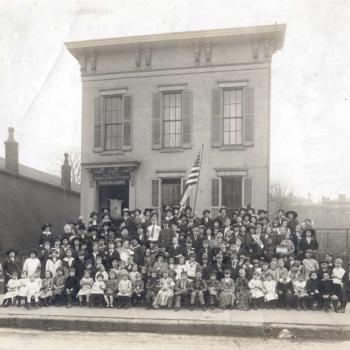Today I’m happy to welcome to the Bench Clay Sidenbender, a freelance journalist based in Edwardsburg, MI.
Last month Anxious Bench contributor Daniel K. Williams imagined an evangelicalism where Northern evangelicalism was at the center instead of its Southern counterpart. This phenomenon actually happened in the mid to late-19th century, when Northern Baptists were the leaders in the denomination.
 In Thoughtful Christianity: Alvah Hovey and the Problem of Authority within the Context of Nineteenth-Century Northern Baptists (Pickwick, 2021), Matthew Shrader of Central Baptist Seminary (MN) recounts the story of Northern Baptists in the 19th century. He does so by telling the story of Alvah Hovey, a reigning theological leader in Northern Baptist life as president of Newton Theological Institution
In Thoughtful Christianity: Alvah Hovey and the Problem of Authority within the Context of Nineteenth-Century Northern Baptists (Pickwick, 2021), Matthew Shrader of Central Baptist Seminary (MN) recounts the story of Northern Baptists in the 19th century. He does so by telling the story of Alvah Hovey, a reigning theological leader in Northern Baptist life as president of Newton Theological Institution
In an interview with me, Shrader said that very little research had previously been done on the 19th century Northern Baptists. If people could identify a Northern Baptist from that time period they might know the names Francis Wayland, former president of Brown University, or Walter Rauschenbusch. Shrader wanted to find someone who represented the time period, and he found that Hovey embodied that person. “He was raised up in that very early Baptist theological milieu and then he started teaching in 1849 and taught all the way until 1903, his death,” Shrader said. “So, half a century where we don’t know very much, he was primary.”
Growing up, Hovey’s parents raised him with a Calvinistic Christianity. As he entered adulthood, he felt called to ministry. He attended Dartmouth College and then Newton Theological Institution. After school, he pastored a church for one year, then taught at Newton for the remainder of his life.
Hovey served as a chief defender of Christian orthodoxy during his day. In response to biblical criticism, he published numerous articles and books that defended basic Christian beliefs. One such book, The Miracles of Christ As Attested by the Evangelists (1864), defended the miracles of Jesus Christ. “I think Hovey represents more of the person in the pew than what some of these more progressive thinkers would be,” Shrader said. “Not everyone in the pew could think as deeply as Hovey could. That’s true, but I think he represented more of the theological consciousness of Northern Baptists than what some others could represent.”
He also responded to the theological liberalism of his day. One of the most significant cases of theological liberalism that Hovey was involved in was William Newton Clarke. Clarke and Hovey were close friends and the former served as the latter’s pastor for a little more than a decade. “Clarke becomes the quintessential liberal and person who would accept higher criticism,” Shrader said. “[Hovey] was always reserved and he would say that there’s a place for critical studies and we should see what the conclusions are going to be.”
While Hovey allowed biblical criticism to be discussed and analyzed, he was not convinced of its conclusions. Another leading reformed Baptist theologian Augustus Strong pushed back on him for not being more vocal about his disagreements with Clarke.
Not surprisingly, Hovey was a staunch proponent of theological education. During this time, some people questioned whether ministers needed education because the need to get the preaching out in the public was great. “Hovey was of the opinion that theological education was important because there were bigger questions than just that pressing need to get out there,” Shrader said. “Ministry was complex because issues are complex, and people are complex.”
However, Hovey did understand that just because someone had the education, didn’t mean they were a pastor. The church had to bring along those young men who seemed to have the gifts from God to be a pastor.

In addition to theological teaching and defending orthodoxy, Hovey also remained socially active for much of his life. In his years at Dartmouth, he was a part of an anti-slavery society and a temperance society. “I take it that he simply believes an in individual sole liberty as a Baptist idea and applies that a little broader to the public and to your citizenship as part of a country,” Shrader said. “And he just sees slavery as contradictory to such an idea.”
Shrader also noted that Hovey came from the north, so he was likely influenced by the context of his location. While he had a friendship with Dartmouth’s president at the time, Nathan Lord, who was an abolitionist up until 1847, when he changed his view to pro-slavery, Hovey remained an abolitionist his entire life.
Later in life, Hovey became a part of an anti-divorce society and remained active in temperance movements as well. His wife, Augusta, involved herself in many women’s groups.
In essence, he did not divide his theological work from social activism. Shrader said most Protestants of Hovey’s day were involved in some sort of social activism. Some historians believe evangelicals became less involved with social issues in the 1930’s and 40’s after the Social Gospel movement.

The reason Shrader became interested in the subject of 19th century Northern Baptists and Alvah Hovey is because he wanted to know his own history. He has grown up in Baptist fundamentalism and wanted to know more about the theological influences of that movement. “You can find studies about the Southerners because you have a lot of Southern Baptist historians who have dug into that, but the Northerners not as much,” Shrader said.
He said that Hovey was a complex person, and it is easy to critique what people did during his lifetime. Shrader tried to understand Hovey by his own terms, titling the book Thoughtful Christianity because Hovey tried to give answers to questions the culture around him asked. Shrader admits that the issues of Hovey’s day may be different from the issues of today, but he said he appreciated Hovey’s intellectual rigor: “He helped forge this Northern Baptist theological tradition and that makes him more influential than we realize. I don’t know if I know the full extent of his influence either, but I think that’s a big takeaway.”
Even though much has changed for Northern Baptists since Hovey’s day, there is a continuation of social activism in some Northern Baptist denominations today. Yet, one must wonder where the intellectually rigorous and theologically minded spirit of Hovey has gone.

















